Sustainability educators agree that colleges and universities should support the ability of students to design and lead change in multiple spheres—organizations, communities, states, and internationally. How well are we supporting students in understanding change processes and developing the skills they need to become change makers? Over recent weeks, Service Learning and Partnerships Specialists Rebecca Watts Hull and Ruthie Yow worked with five young energy equity leaders with Metro Atlanta Youth Energy Corps (MAYE Corps) to explore these questions and plan a webinar offered through the Association for the Advancement of Sustainability in Higher Education (AASHE). On June 9, more than 50 participants tuned in to explore this topic with SLS and our MAYE Corps partners Unwanna Etuk, Brittany Judson, Marisol Mendez, Zoie Moore, and Gwyn Rush.
We began by discussing what we mean when we say we “equip students to be change agents.” Does that mean supporting student organizations working for change? Incorporating community-engaged service-learning into courses? Empowering students through internships, events, and other interactions with change-making organizations? Voter registration efforts on campus? More focus on theories of change, historical examples, and direct learning with contemporary change-makers? Helping students use their disciplinary skills and knowledge to build sustainable communities? All of the above?
Participants shared a range of ideas and perspectives on this question, including: providing skills, support, and space to develop community organizing, campaigning, and leadership strategies; giving students room to see themselves as strong individuals who want to learn (versus passive learners); sharing with students the tools needed to work on issues that drive them; supporting students to think about systems of power at different scales (classroom, university, city, etc.); fostering internal power and confidence to use their voices for good; guiding students toward deep observation about what can be changed around them and helping them seek inspiration and guidance in effective change from others; teaching students how to network; and sharing examples of the struggles and pressures experienced by change agents.
The MAYE Corps presenters opened the discussion about ways that colleges and universities can more effectively equip students to be change agents. They shared five key areas of focus that they feel would advance this important element of sustainability education:
- Help students see that they are capable and powerful.
- Emphasize that leadership takes many different forms, and that all can be leaders.
- Support students in becoming more confident in their capabilities.
- Provide guidance to students who are passionate about social change but don’t tell them what to do.
- Build greater flexibility and student choice into majors and courses.
- Make it easier for students to assemble the courses that make sense for them.
- Draw on principles of democratic schools for a greater student role in course design.
- Expand transdisciplinarity in the classroom.
- Integrate core course concepts with social context.
- Build in greater flexibility so STEM majors can pursue their passion for social change without getting completely burned out.
- Offer community-based experiences that place courses in “real world” context.
- Support faculty in creating course/community partner connections.
- Make connections between class material and social change organizations.
- Support students in finding internships and translating experiences into marketable skills.
- Support student leadership capacity-building.
- Provide small grant opportunities for student-led social change organizations.
- Replace some class papers with grant proposals (authentic assessment).
Echoing some of what the MAYE Corps young leaders shared, the webinar participants described ways they seek to equip students, including through: internship programs, service-learning opportunities in and outside course work, living labs, sustainability clubs, exposure to professionals who work at the intersection of sustainability and social change, and candid discussions with students about personal experiences of challenge and growth. Participants also discussed the barriers they face in doing this work, which are likely familiar to many who work in higher education, such as: funding, bureaucratic hurdles, rigidity in the curriculum or administrative resistance to change, constraints of student, faculty, and partner time, and a lack of resources for training faculty - and then students- to work collaboratively on big issues such as climate action.
Finally, we asked participants to share their dreams/ambitions for their teaching and institutions, unfettered by the constraints they had previously shared. Their responses varied from small but important tweaks to current processes or offerings--such as coding community-engagement courses so that students could recognize them immediately and creating workshops for students to get additional training on community-based projects-- to broader visions for equipping students as change-makers, such as creating an urban or regional “studio” program for university-partner collaborations and founding a student-run NGO that brings in students from each new first-year class and works continuously on long-term community partner projects. As a testament to the inspiring work of the MAYE Corps, one participant shared that their big dream would be “an organization like MAYE Corps that really allows students or recent graduates to share their experiences as social change agents across multiple institutions.”
At SLS, we share that admiration for the work of MAYE Corps, and for the faculty at Georgia Tech, and beyond, who are committed to supporting students who envision a different, more sustainable, and more just world, and who are determined to use their education as a springboard toward that vision.
Missed the workshop?
View the webinar recording, slides, and Jamboard notes here, on AASHE’s website; a direct link to the webinar recording can be found here.
Want to engage with others on this topic?
Help SLS generate ideas for a follow-on workshop, and/or join this fall’s Faculty Learning Community on Teaching with the SDGs. Contact Rebecca for more information or to express interest.
Our MAYE Corps presentation Partners:
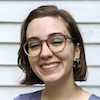 Gwyn Rush, Public Relations Coordinator, Metro Atlanta Youth Energy Corps (MAYE Corps)
Gwyn Rush, Public Relations Coordinator, Metro Atlanta Youth Energy Corps (MAYE Corps)
Gwyn Rush (she/her) is a recent Agnes Scott College graduate and Public Relations Coordinator at the Metro Atlanta Youth Energy Corps (MAYE Corps)–a youth-led environmental justice organization. While at Agnes Scott, she majored in International Relations and created her own major theme in Sustainable Development. In her senior capstone paper, she created a new theoretical framework that combined postcolonial & green political theories to better understand the success of the Green Belt Movement–an environmental justice movement in Kenya. At MAYE Corps, Gwyn leads a team of fellow young people to make sure the organization’s social media, website, and other communications reflect and advance MAYE Corps’ goals of racial and social justice, youth leadership, and local collaboration. Gwyn was recently accepted into the University of London to pursue an MSc in Environment, Politics, and Development starting fall 2021.
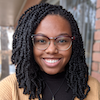 Unwanna Etuk, student and Education and Outreach Developer, The Georgia Institute of Technology and MAYE Corps
Unwanna Etuk, student and Education and Outreach Developer, The Georgia Institute of Technology and MAYE Corps
Unwanna Etuk graduated from Georgia Tech in the fall of 2019, specializing in Sustainability and Global Development. She volunteers with MAYE Corps (the Metro Atlanta Youth Energy Corps) as a part of the Education & Outreach committee with a focus on partnerships. Unwanna enjoys building a robust network with sustainability professionals across the metro area and sharing resources with her community. Unwanna works at a nonprofit called The Ray as the team’s Partnership Coordinator & Research Analyst, and she enjoys spending her free time dancing salsa, bachata, and zouk.
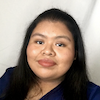 Marisol Mendez, student and Public Relations Developer, Kennesaw State University and MAYE Corps
Marisol Mendez, student and Public Relations Developer, Kennesaw State University and MAYE Corps
Marisol Mendez is a senior at Kennesaw State University, majoring in International Affairs and Geography. She has served at her University’s Presidential Commission of Sustainability and works for MAYE Corps, a youth-led organization focused on addressing energy burdens in Metro-Atlanta. She is Climate Reality Leader and a Distinguished UN-SDG Ambassador for CIFAL Atlanta.
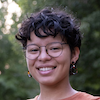
Brittany Judson, Independent Consultant
Brittany is a Just Growth Consultant at the Partnership for Southern Equity (PSE). Currently, her work involves research and community engagement planning for the City of East Point’s Equitable Growth and Inclusion Strategic Plan. She also provides logistical coordination for PSE’s Resident Leaders for Equity (RLE) Regional Academy. Brittany is also an independent consultant currently working on projects related to climate resilience planning with Agnes Scott College and the City of Decatur. Brittany is an advocate of youth-powered solutions and spends her time volunteering primarily with the Metro Atlanta Youth Energy Corps, an organization committed to addressing energy inequities through youth leadership, racial equity, and local collaboration. Her hometown is Tampa, Florida and she is the daughter of a Filipina mother and Caymanian father, both proud immigrants. Outside of work, Brittany loves bicycling, playing the ukulele, and journaling.
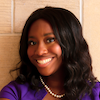
Zoie Moore, Education and Outreach Coordinator, Metro Atlanta Youth Energy Corps (MAYEC)
Zoie Moore (she/her) is a senior at Agnes Scott College majoring in Africana Studies with a double minor in Education and Environmental Studies and Sustainability. Zoie is very passionate about tackling environmental injustices and teaching sustainability practices to her community. When she’s not reminding her friends to recycle, you can find Zoie in the library catching up on the latest Young Adult novel, dancing, or watching anime and cartoons.
Rebecca Watts Hull, PhD is a Service Learning and Partnerships Specialist with SLS and Adjunct Academic Professional in the School of History and Sociology. Her role with SLS includes facilitating integration of Education for Sustainable Development throughout the curriculum.
Ruthie Yow, PhD is a Service Learning and Partnerships Specialist with SLS and Adjunct Academic Professional in the School of History and Sociology. Her role with SLS includes developing student facing initiatives, such as SLS’s Internship Program, and helping to expand SLS’s programming related to equity.